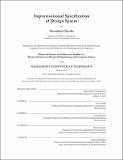Improvisational specification of design spaces
Author(s)
Charidis, Alexandros
DownloadFull printable version (6.825Mb)
Other Contributors
Massachusetts Institute of Technology. Department of Electrical Engineering and Computer Science.
Advisor
Terry Knight and Caitlin Mueller.
Terms of use
Metadata
Show full item recordAbstract
As a mathematical abstraction and as a model for automated problem solving, the classical notion of a design space has proven convenient for the sciences and the engineering disciplines over the past sixty years. This is also true for models of calculating in design. These models, however, assume implicitly that a design space, one of possible compositions of shapes, is invented as a one-off final description or specification of designs, and that the individual who designs or composes has nothing new to contribute in the calculations other than to search and select among available possibilities. I suggest that this is limiting for the visual fields, such as architecture and applied arts. In this thesis, I articulate a novel, improvisational theory of design spaces. I describe a model of calculating an improvisational specification that complements the proposed theory and reconciles classical analytical approaches with the open-ended creative practice of improvisation. The proposed specification is based on the shape grammar formalism and the associated algebras of shapes due to their unique treatment of shapes as raw, unanalyzed pictorial entities. The model is made of two calculating procedures: a. compositional rules are applied on shapes and their parts distinguished in observation, b. backwards descriptive rules specify the composition in terms of topological decompositions of shapes. Improvisation moves forward through compositional rules applied perceptually on shapes, while the design space in which composition happens is specified backwards by studying how shape decompositions map continuously from one rule application to another. I describe the differences between the proposed improvisational specification and classical specifications, which are defined in terms of symbols rather than spatial, pictorial entities. I outline important extensions to the proposed formalism and conclude by proposing improvisation as an alternative umbrella concept that presents opportunities to expand classical conceptualizations of design spaces from exclusive engagement with analysis as a form of preliminary projection of results before calculating.
Description
Thesis: S.M. in Architecture Studies, Massachusetts Institute of Technology, Department of Architecture, 2017. Thesis: S.M., Massachusetts Institute of Technology, Department of Electrical Engineering and Computer Science, 2017. This electronic version was submitted by the student author. The certified thesis is available in the Institute Archives and Special Collections. Cataloged from student-submitted PDF version of thesis. Includes bibliographical references (pages 93-97).
Date issued
2017Department
Massachusetts Institute of Technology. Department of Architecture; Massachusetts Institute of Technology. Department of Electrical Engineering and Computer SciencePublisher
Massachusetts Institute of Technology
Keywords
Architecture., Electrical Engineering and Computer Science.